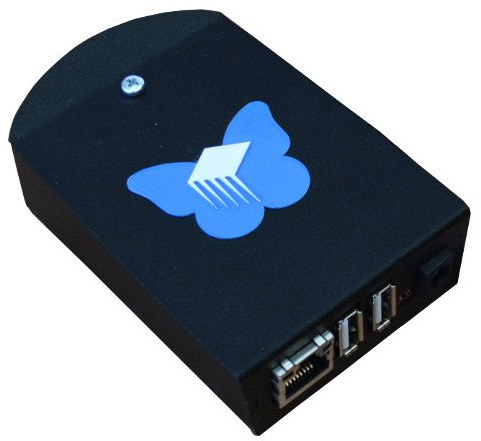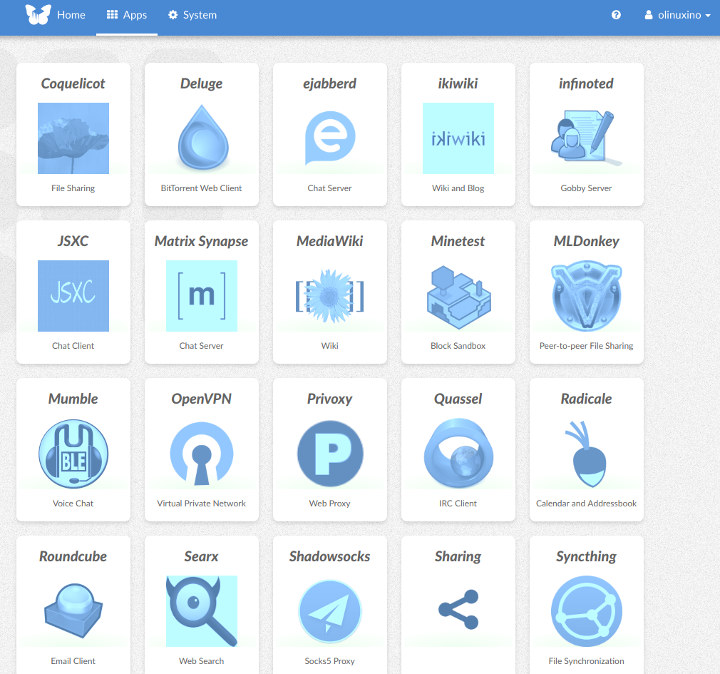Olimex works on open source hardware boards, while the FreedomBox Foundation has been developing FreedomBox, a free and open source private server system, since 2010 with the goal of empowering regular people to host their own internet services, like a VPN, a personal website, file sharing, encrypted messengers, a VoIP server, a metasearch engine, and more.
When you mix open source hardware, open source software, and a bit of Internet freedom it gives birth to a product called “Pioneer Edition FreedomBox Home Server” based on Olimex A20-OLinuXino-LIME2 board and running FreedomBox software.
 Pioneer Edition FreedomBox Home Server specifications:
Pioneer Edition FreedomBox Home Server specifications:
- SoC – Allwinner A20 dual-core ARM Cortex-A7 CPU @ 1.0 GHz with dual-core Mali 400 GPU
- System Memory – 1GB DDR3
- Storage – microSD slot fitted with 32GB class 10 card loaded with FreedomBox, SATA data and power connectors, 2KB EEPROM for MAC address and custom data
- Connectivity – Gigabit Ethernet
- Video Output – HDMI up to 1080p60
- USB – 2x USB 2.0 host ports with power control and current limiter, 1x micro USB-OTG with power control and current limiter
- Power Supply – 5V DC
- Battery – 1400mA /3.3V LiPo battery for UPS power backup supply (good for about 4 to 5 hours)
- Dimensions – TBD (custom metallic box with FreedomBox decal); board only: 84×60 mm
The board ships with an enclosure, a one meter Ethernet cable, a power supply together with optional plug adapter for US or UK.

The included 32GB microSD card is preloaded with FreedomBox for LIME2, which you can also download here to install on your existing LIME2 board. FreedomBox firmware image gives you easy access to the Tor browser, private encrypted file sharing, private encrypted chat, peer-to-peer file sharing, voice chat, a web proxy, VPN, IRC client, private calendar and address book, file synchronization, distributed file storage, and your very own hosted Wiki and Blog.
FreedomBox has already been deployed to several locations, including recently in India using donated old computers to bring Internet connectivity to villages. A single board computer solution may cost less overtime due to electricity usage. Beside the LIME2, Freedombox also runs on various other hardware platforms including BeagleBone Black and the Raspberry Pi boards.
However, if you can purchase Pioneer Edition FreedomBox Home Server, it also sponsors the project. You can do so on Olimex store for 82 Euros.

Jean-Luc started CNX Software in 2010 as a part-time endeavor, before quitting his job as a software engineering manager, and starting to write daily news, and reviews full time later in 2011.
Support CNX Software! Donate via cryptocurrencies, become a Patron on Patreon, or purchase goods on Amazon or Aliexpress





I’m wondering what throughput one can get with VPN (as a client device).
Also it would be nice if it came with two network interfaces, one for internal, one for external.
Now one either needs to use an USB dongle or connect it to the internal network. I’d rather have things like VPN on the outer edge of my network
Kudos to Olimex for making something like this and supporting the devs, but yah, this board has a lot of shortcomings and is overpriced. There are no crypto extensions so I am guessing the vpn will struggle. The best bet would an espressobin: http://espressobin.net/
I don’t know much about FreedomBox but it seems like there isn’t a whole lot of activity in regards to this project. Their latest release is from 2017 and their recommended hardware list features mostly a bunch of old boards with 100 Mbs ethernet.
At least something happens (again): https://ftp.freedombox.org/pub/freedombox/logs/
The most ‘modern’ ARM board with suitable crypto extensions is the Pine64+ and by relying on the ‘debootstrapping upstream Debian’ approach they ensure not much will change and only really mature ARM hardware will ever be supported…
Just learned that Freedombox is deeply integrated into Debian: https://wiki.debian.org/FreedomBox/Hardware/Debian
It seems all ‘the magic’ happens in some scripts/services contained in Debian’s
freedombox-setuppackage. As such it should run on all hardware for which Debian Stretch (or Buster soon) is available.According to the reviews for the EspressoBin in enclosure on Amazon, the box runs very hot and also that the software implementation is not that great.
Have you had better experience that that?